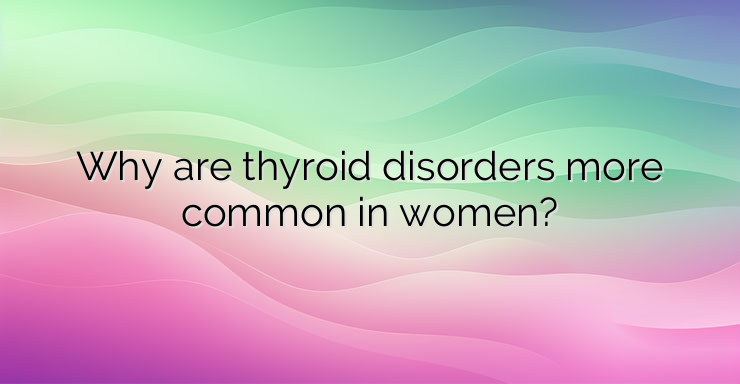The thyroid gland is the largest endocrine gland in the human body. It is butterfly-shaped, formed by two connected lobes. It is located in the neck, usually at the level of the fifth cervical and first thoracic vertebrae. The two main hormones produced by the thyroid gland are triiodothyronine (T3) and thyroxine (T4). They could affect the metabolism, menstrual cycle, heart rate, body temperature and many other processes important to the body. Approximately 1 in 8 women will be affected by thyroid disease at some point in their lives. The risk in women is about 10 times higher than in men. One reason is that thyroid disorders are due to autoimmune reactions, which are more common in women than in men. Another reason for the wider spread of thyroid diseases among the fairer sex is the relationship between thyroid hormones and hormones involved in the regulation of the menstrual cycle. These are luteinizing hormone, follicle-stimulating hormone and the female sex hormones – estrogen and progesterone. Thyroid problems can occur at any stage of a woman’s life, but are especially common during and after menopause. This is due to the drastic changes in the levels of various hormones. Some women confuse the symptoms of thyroid disorders with the effects of menopause. This usually leads to the later diagnosis and treatment of hypo- or hyperthyroidism in postmenopausal women. The most common symptoms of thyroid disease in women are fatigue, cold intolerance, thinning hair, weight changes, and changes in the menstrual cycle. There are two types of thyroid disease. Symptoms vary depending on whether the body is producing too much or too little hormone. The most common condition is hypothyroidism. In hypothyroidism, the thyroid gland is considered underactive and does not produce the required amount of hormones for the body. The second is hyperthyroidism. With it, the gland is overactive and produces too many hormones. Regular follow-up of thyroid gland disorders by an endocrinologist is very important, as the dose of administered medication may need to be adjusted, depending on the woman’s condition. Sources: https://www.womenshealthmag.com/health/a39799609/thyroid-health-myths-women/ https://www.northwell.edu/obstetrics-and-gynecology/fertility/expert-insights/11-unexpected- signs-of-hormonal-imbalance https://www.lifespan.org/lifespan-living/thyroid-conditions-women-symptoms-treatment-and-care https://www.harleystreetent.com/blog/why-women- are-more-prone-to-thyroid-problems


Leave a Reply